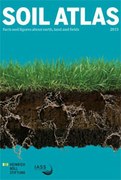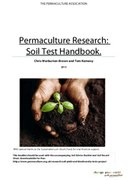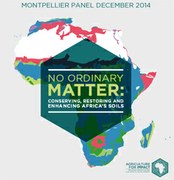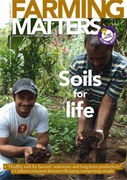Soil Atlas 2015: Facts and figures about earth, land and fields

Soils are the basis of our food production and much more, and this book explains much and in an easily readable way. Short pieces of text and infographics make the messages clear. For example, in explaining the global picture of the rate at which we are losing soil to erosion, contamination and declining soil fertility. But this book also covers the role of soils in land policy, tenure, mining, urbanisation, ‘green’ cities and traditional systems.
Although there is an emphasis on where we are going wrong, the Soil Atlas does also showcase positive experiences. From innovative grazing techniques keeping pastoralists on their land, cooperation between farmers to stop soil erosion, and to urban design that includes food production – the message is clear. Whether a farmer or not, soils concern us all, and soil conservation deserves global attention.
Permaculture research: Soil test handbook

Permaculture seeks to create systems where natural soil fertility is fostered and describes a healthy soil as having three main characteristics; rich and diverse biological life, good structure and available nutrients.
This handbook outlines how to conduct ‘farmer-friendly’ soil tests requiring no special training or equipment, and focuses on the first two characteristics of a healthy soil. The tests cover a range of soil properties including, drainage, earthworm population, pH, soil texture, topsoil depth and soil compaction. Instructions for carrying out the tests are clear and easy to follow. It is available online, accompanied by the ‘soil advice handbook’ which helps to interpret test results. This is a practical resource for farmers who want to learn more about soil testing, and the Permaculture Association welcomes feedback from farmers around the world so that they can keep improving them.
No ordinary matter: Conserving, restoring and enhancing Africa’s soils

Soil is a resource that has for too long been neglected in the policy realm. This report is a strong plea to donors and governments, to adopt a long-term vision and backed by adequate financial support, to help farmers nurture, conserve and restore their soils.
This book looks at the extent of soil degradation in Africa and the role of traditional and ecological approaches to building up soil organic matter and biota. Climate change, and the need for both mitigation and adaptation, is highlighted as an urgent reason why agricultural management must aim to build soil carbon and resilient systems.
Recommendations range from the grassroots, building on existing local and traditional knowledge, to higher level policy decisions such as attributing values to land degradation, and securing land rights that create incentives to invest in the soil.
Soils ‘classics’
Attempts to uncover the mysteries of soils date back to ancient times. Four thousand years ago, Zoroaster described the wheel of life, death, decay and life in which the soil plays a pivotal role, and which laid the basis for Vrksyurveda, the ancient Indian science of plants and farming techniques. This knowledge came to Europe in later classics, such as ‘Farmers for Forty Centuries, Permanent Agriculture in China, Korea and Japan’ published in 1911 by Franklin Hiram King, who was impressed by the high productivity and long term sustainability of agricultural practices in ‘the Orient’, and how farmers recycled everything possible. The book is currently reviving in reprints and is an excellent read.
Another classic is ‘An Agricultural Testament’ by Sir Albert Howard from 1940, describing how the industrial revolution is destroying the earth’s capital – the soil. He related soil fertility to human health but proposed solutions too, including the famous Indore composting method.
Essential reading must also include Lady Eve Balfour’s ’The Living Soil’ from 1943, and which inspired the founding of the Soil Association three years later. The book provides evidence of health benefits of the organic food and how compost-based fertilizers raise healthier plants than chemical fertilizers, the reasons resting in soil life, and was considered a distinct threat to the new fertilizer industry.
Another critic of industrial agriculture is Fukuoka from Japan. In his ‘The One Straw Revolution’ from 1975, he describes the ‘do-nothing’ technique in which enriching the soil plays a central role, and sustainable practices that eliminate the need of pesticides, fertilizers, tillage and avoid heavy and tedious work. Fukuoka probably builds on one of the fundamental principles in Taoism, wu wei, meaning “do nothing …. against the laws of nature.”
Three key films about soils
Soil Farmers (2015, 45m, Dutch with English subtitles;www.bodemboeren.nl, ILEIA). Five Dutch farmers share why and how they continuously experiment with ways to manage their soils more sustainably. Together, these farmers are part of a ‘new soil story’ based on old, (sometimes forgotten) and new (sometimes surprising) knowledge. They build their natural capital: healthy soil life with plenty of air, water, carbon and minerals.
Symphony of the Soil (2012, 104m, English with subtitle options in Spanish, French, Chinese, German, Italian, Portuguese; www.symphonyofthesoil.com)Drawing from ancient knowledge and cutting edge science, Symphony of the Soil is an artistic exploration. By understanding the relationships between soil, water, the atmosphere, plants, animals and human beings, it uncovers the complex nature of soil, as well as the use and misuse of soil in agriculture, deforestation and development. Filmed on four continents, featuring both scientists and farmers, the film highlights possibilities for healthy soil management.
DIRT! The movie (2009, 126m, English with German subtitle option; www.dirtthemovie.org) Narrated by Jaime Lee Curtis, this film brings to life the environmental, economic, social and political impact that the soil has. It shares the stories of experts from all over the world who are working to harness the beauty and power of a respectful and mutually beneficial relationship with soil.

